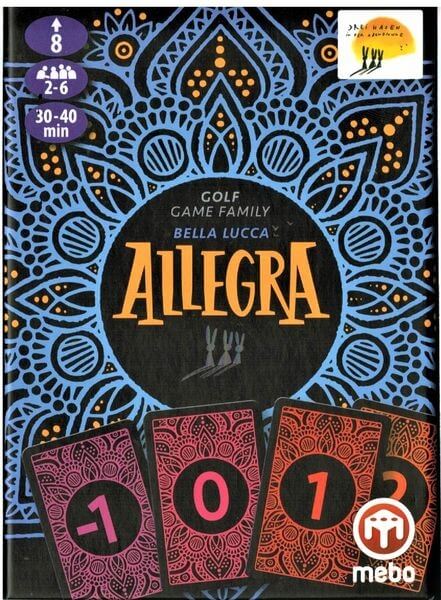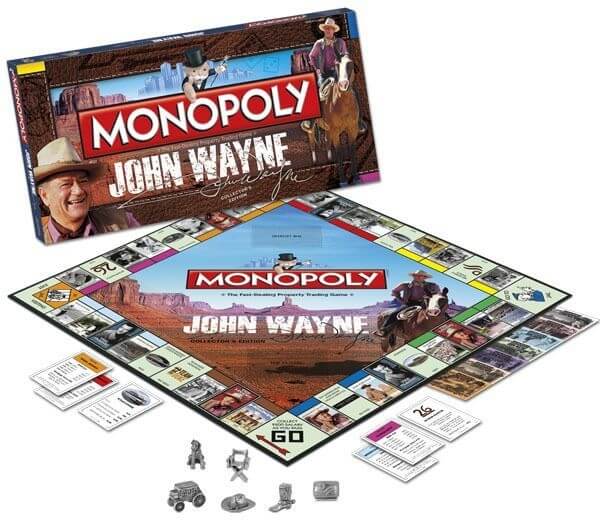
Allegra
In Allegra, players get involved in a fun strategic dynamic, where the aim is to keep the score as low as possible. Inspired by the popular card game "Golf", each game is full of astute decisions and interactions between the participants. The game uses a deck of cards numbered -1 to 11, and in each of the three rounds, all players start with twelve cards arranged inverted in a grid of four columns and three rows. It is important to note that the rightmost column is also part of the game of the neighbor to the right, and vice versa, creating a network of interdependencies. Each turn, players have the opportunity to draw a card from the deck or from the top of the discard pile. If they choose the discard pile, they must exchange the chosen card for any card in their area. If they "draw" from the deck, they can discard it or exchange it for a card of their own. In addition, any player can "tap" the table when they see a card they want, which adds an element of competition to the game. The mechanics of eliminating cards are innovative: when a player gets three identical cards in a row or column, those cards are discarded from the game. The end-of-round announcements are exciting because when you activate the end, all the other players play once before the final score is tallied. If the player who finished the round doesn't have the lowest sum, their score is doubled. With the game ending after three rounds, the player with the lowest total score is declared the winner. Allegra combines strategy, social interaction and lots of fun, ensuring that each game is unique and full of surprises.Artists: Johann Rüttinger;
Designers: Bella Lucca;
Date: 2020
Note: 6.1
Mechanics: Collecting Sets, Building from a Model, , Team play, Auction / Bidding, Highest Score Low, Semi-Cooperative
Table of Contents
- How to Play
- Tips for playing
- Game mechanics
- Game components
- Additional Information
OBJECTIVE OF THE GAME
Tips for playing
Here are some tips for doing better in the game Allegra:
- Explore every corner of the map to find hidden items.
- Use Allegra's powers strategically to maximize their impact.
- Talk to the NPCs, they can offer valuable clues.
- Manage your resources carefully so you don't run out of essential items.
- Look for patterns in enemy attacks to dodge better.
- Save your progress regularly to avoid missing out on important achievements.
- Try out different combinations of weapons and skills to see what works best in each situation.
- Pay attention to the details of the environment; they can offer solutions to puzzles.
- Improve your skills regularly to face more difficult challenges.
- Don't be afraid to step back and rethink your strategy in more complicated encounters.
Video about the game
GAME mechanics
- Collecting Sets: In Allegra, players compete to collect sets of cards representing different resources. Each complete set awards points to the player, and specific combos can unlock special abilities or multiply points. The strategy lies in deciding which sets to prioritize, balancing between completing a set quickly or waiting to collect a more valuable one.
- Building from a Model: Players are given a basic model of a kingdom which they must expand over the course of the game. Using the cards they collect, they build structures and monuments that fit into the model's layout, seeking to optimize the available space and maximize points through predetermined patterns or adiacency bonuses.
- Deck creation: Each player starts with a basic deck, adding new cards throughout the game through purchases or trades. Deck creation in Allegra is crucial to customizing players' strategies, allowing them to improve future actions and respond to opponents' tactics effectively.
- Team play: Allegra allows for the formation of temporary alliances, where players can join forces to fulfill specific objectives. This team component is not fixed, requiring players to navigate dynamic relationships, sometimes betraying or strategically allying for momentary advantages.
- Auction / Bidding: Valuable resources and cards are acquired through an auction system, where players bid secretly using coins or other forms of in-game capital. Deciding how much to bid or when to pass is a critical part of the strategy, directly influencing available resources and personal savings.
- Highest Low Score: This mechanic challenges players to maintain a careful balance, since at the end of the game, the lowest average score between different categories of cards or resources defines the winner. This forces a balanced strategy, preventing players from focusing too much on a single scoring area.
- Semi-Cooperative: While each player competes for the individual title, Allegra incorporates semi-cooperative elements, where global events can affect all the kingdoms. Players must work together to mitigate disasters or community bonuses, but at the same time plan when and how to prioritize their own interests over those of their opponents.
Game components
See all the items in the game below Allegra:
- Action cards
- Game pieces
- Game board
- Stitch markers
- Special data
Additional Information
- Ludopedia link: https://ludopedia.com.br/jogo/allegra
- Link Tabletopia:
- Amazon Brazil link: Comprar Allegra
- Amazon USA link: Comprar Allegra


